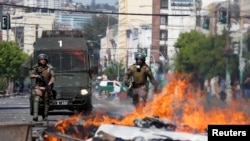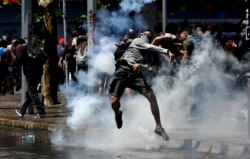A four-year-old child was killed during the latest round of protests against economic inequality in Chile, raising the death toll from five days of social unrest to 18 as unions launched a general strike on Wednesday.
The child and a man were killed on Tuesday when a drunk driver rammed into a crowd of protesters, Interior Undersecretary Rodrigo Ubilla said. A third person died after being beaten by police, according to the victim's family.
The news came as a two-day strike called by the country's largest union began despite Chile's President Sebastian Pinera announcing on a package of social measures aimed at stemming protests that have at times turned violent.
"THE STRIKE IS ON! We say it loud and clear: enough of the increases and abuses," the Workers' United Center of Chile (CUT), which organized the action alongside 18 other social organizations, tweeted late Tuesday.
Pinera had apologized in an address to the nation for failing to anticipate the outbreak of social unrest, adding that his government had "received with humility and clarity the message Chileans have given us."
He vowed to increase the universal basic pension by 20 percent, cancel a recent 9.2 percent increase in electricity bills and propose a law that would see the state cover the costs of expensive medical treatment.
"I recognize this lack of vision and I apologize to my compatriots," Pinera said in an address from the presidential palace in Santiago following a meeting with some of Chile's opposition leaders.
Pinera also pledged a state subsidy to increase the minimum wage from 301,000 to 350,000 pesos ($482) a month and said the government would introduce health insurance for medication, which is among the most expensive in the region.
Worst violence in decades
Since protests against a now-scrapped hike in metro fares escalated dramatically on Friday, Chile has experienced its worst violence in decades.
Demonstrators have decried social and economic woes, including a yawning gap between rich and poor, in a country normally considered one of the most stable in Latin America.
Having initially taken a confrontational line, declaring that Chile was "at war against a powerful, implacable enemy," and imposing a state of emergency in Santiago and most of Chile's 16 regions, Pinera has rapidly changed tack and sought cross-party support to find a solution.
After widespread scenes of violence, destruction, arson and looting last week, protests have become more peaceful this week, particularly in the capital.
But it's the worst violence to hit Chile since the country returned to democracy after the 1973-1990 rightwing dictatorship led by General Augusto Pinochet.
Some 20,000 police and troops have been deployed while a nighttime curfew was announced on each of the last four days.
Security forces have used tear gas and water cannons on protesters.
Strike organizers issued a statement demanding the government "restores institutional democracy, which in the first instance requires the removal of the state of emergency and return of troops to their barracks."
Before Pinera's announcement, one of Chile's largest conglomerates, Quinenco promised to increase its minimum salaries to 500,000 pesos a month from January 1 -- 60 percent more than the current minimum wage.
Chile's big business conglomerates are one of the major factors in the huge wealth disparity that has angered protesters.
It is the largest producer of copper in the world, much of which is sold to China, but despite 2.5 percent growth, ordinary Chileans are deeply unhappy about low salaries and pensions, as well as health and education systems that are unaffordable for most.
Nine dead in fires
The government started naming some of the dead on Tuesday. Nine had died in fires, one was electrocuted and five were shot, four of those by the security forces.
A Peruvian and an Ecuadorian were among the dead.
Chile's human rights institute said more than 200 people had been taken to the hospital, almost half with gunshot wounds, while many others suffered eye injuries from pellets.
Since the unrest began, more than 2,600 people have been detained.
Despite the strike call, central Santiago appeared largely back to normal on Wednesday.
Three of the Santiago metro's seven lines were open while almost all shops and businesses -- even banks -- appeared to be open downtown.
More than half of Santiago's 136 metro stations suffered heavy damage during last week's protests and remained guarded by soldiers.
Commuters and shoppers faced less queueing but school classes in seven of the Santiago region's 52 communes remained suspended.





